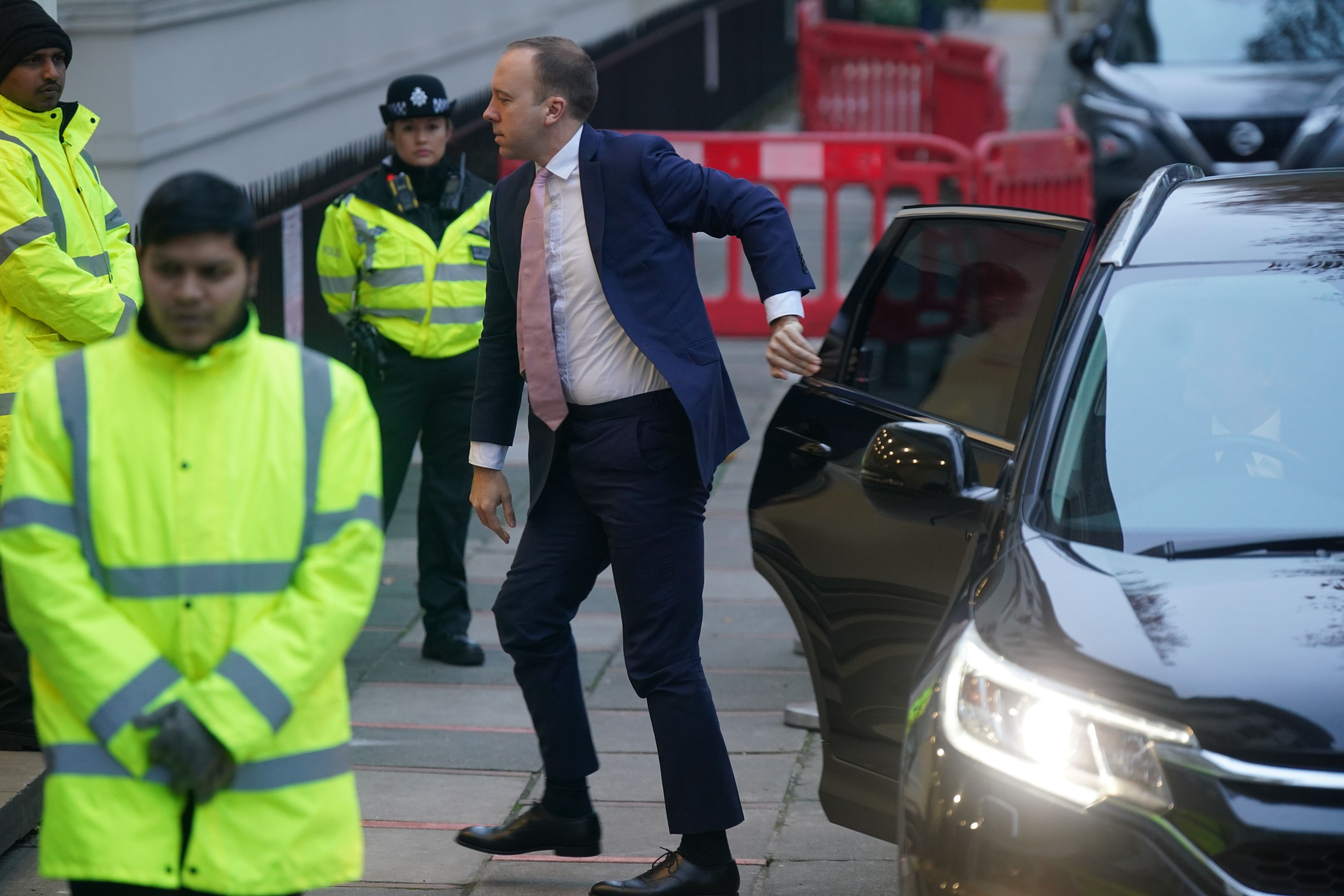Hancock was ‘frustrated’ by reluctance to use private sector in Covid testing
The former health secretary gave evidence to the Covid-19 Inquiry on Thursday.

Your support helps us to tell the story
From reproductive rights to climate change to Big Tech, The Independent is on the ground when the story is developing. Whether it's investigating the financials of Elon Musk's pro-Trump PAC or producing our latest documentary, 'The A Word', which shines a light on the American women fighting for reproductive rights, we know how important it is to parse out the facts from the messaging.
At such a critical moment in US history, we need reporters on the ground. Your donation allows us to keep sending journalists to speak to both sides of the story.
The Independent is trusted by Americans across the entire political spectrum. And unlike many other quality news outlets, we choose not to lock Americans out of our reporting and analysis with paywalls. We believe quality journalism should be available to everyone, paid for by those who can afford it.
Your support makes all the difference.Former health secretary Matt Hancock has told the Covid-19 Inquiry he was “deeply frustrated” by Public Health England’s reluctance to involve the private sector in scaling up the UK’s testing capacity.
He said the agency did not have the capacity to scale up when it came to testing, and expressed doubt that it could be ramped up “at the flick of a switch” if another pandemic hit.
PHE started operating in 2013 as an executive agency of the Department of Health and Social Care (DHSC).
It was dissolved in October 2021 and replaced by the UK Health Security Agency (UKHSA).
Giving evidence to the inquiry on Thursday, Mr Hancock said: “It was deeply frustrating that there was an unenthusiasm, if I put it diplomatically, to engage private sector testing capacity, and I personally had to get involved in sorting that out.”
He said PHE “wouldn’t engage any private commercial entity”.
“There were a couple, which I mentioned in my statement, who I asked them to contact because they’d come to me,” he added.
“I wanted them to support any private entity that could expand testing. It wasn’t about these particular companies, what I wanted was testing capacity.”
Mr Hancock said there “was a view” that the country had a large number of “very small” labs in hospitals and universities, and they should be used.
“But they were not scalable models,” he added. “They were small and they were essentially structured for science rather than structured for throughput.”
It’s a vital, vital lesson for the future that we need a testing system ready to go, and I’m worried that that is not there right now
Mr Hancock was asked by inquiry counsel Hugo Keith if he had any concerns about PHE’s response to the pandemic in February-April 2020, and he answered: “Yes, I did.”
He hailed PHE’s capabilities in scientific research, lab work and analysis, but said “its capacity to scale was simply not there”.
“It had a contact tracing system that was based on top quality, highly trained experts,” Mr Hancock added.
“Whereas what we needed was much more like a call centre, Henry Ford-style, high-volume contact tracing system that we eventually built.”
He told the inquiry: “It’s a vital, vital lesson for the future that we need a testing system ready to go, and I’m worried that that is not there right now in case there’s a pandemic.
“What happens if one of these things, one of these diseases that we’ve read about in the last couple of weeks, the influenza in northern China, becomes a pandemic?
On every different way you could possibly count these measures, we hit that target
“My question now to the secretary of state (for health) would be, ‘How quickly can we get to 100,000 tests? How quickly are we going to get a vaccine? How quickly are we going to have 5,000 people in a call centre doing contact tracing?”
Mr Hancock said the testing system set up in the pandemic had been understandably “stepped down” but added: “What you need is the ability very rapidly to put it back in place.
“That is what I’m concerned about. For instance, recently one of the major labs was put on the market. I think it would be better if it were mothballed and ready to go at the flick of a switch.”
He rejected allegations of “creative counting” on testing targets after being accused at the time of counting tests that had not yet been taken.
The inquiry was shown a message from former cabinet secretary Mark Sedwill, sent to Mr Hancock on May 1 2020, about Mr Hancock exceeding his target for 100,000 tests per day to be carried out.
The message from Mr Sedwill said: “Well done this evening. Creative counting and 122k!”
Mr Keith asked Mr Hancock: “Do you accept or reject the suggestion of creative counting?”
Mr Hancock replied: “I reject it, and on every different way you could possibly count these measures, we hit that target.”